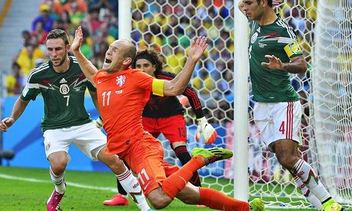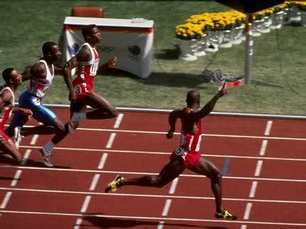
While watching (and supporting the Dutch at the World Cup - in part influenced by Winner's earlier book) I was struck by the reaction of TV commentators and analysts to Arjen Robben's propensity to fall in a heap at the slightest touch from a defender. Even when it was clear that Robben had been fouled he made sure the referee noticed it.
I was reminded of a passage in Dennis Bergkamp's book:
In Italy you have two strikers against five defenders, so you have to find ways to protect yourself. You have to find ways of keeping the ball, doing your job properly and doing it well. So, if you are up against five defenders and you get the ball and you get a little touch, you go down. Is it cheating? In England it is cheating. In Italy it's just part of the game. So you adjust to the Italian game. It's normal. And then you come to England and you realise, wait a minute, you can't do that here. It's not acceptable. I'm not sure...I don't call it cheating. I have seen players who cheated. It's very difficult to say, but I sometimes used it. But I think most of the time I was honest.
A lot of times you get pushed or you feel a little touch and that stops you reaching the ball. If you run on you won't get a free-kick because no-one noticed it. So you have to react a little bit more. And then you get the free-kick. (You exaggerate a little to bring it to the referee's attention). But there has to be contact before I go down. I think cheating is something different. For me, cheating is if you go past the defender, there is no contact then you roll over, you go down. The schwalbe, as the Germans say. That's real cheating. I didn't do that. But if there is contact, it's a matter of how do you exaggerate? If you don't, you won't get a free-kick. If you do you might get a free-kick or a penalty or whatever.
Interviewer: But too much of that is also cheating surely?
Yes, but it's a really difficult area. For me, it's not acceptable if you don't get touched but go down because you still want a free-kick. I really don't approve of that. But where you are always battling with the defender and he's touching you and you stay on your feet, you're not going to get a free-kick. I think you have to act a little bit..."Jeez, come on ref!" There are plenty of times where a foul is committed and you don't get a free-kick. What do you call tha then? That's the other side of it. You get pushed and the referee doesn't see it. Is that cheating by the defender? That doesn't exist does it? It's cheating. He's cheating. The referee didn't see it, but he pulls you back. That is the other part of cheating, I feel. Doing something behind someone's back and that happens all the time. I got really frustrated in my first season at Arsenal. I'm definitely not a cheat and I don't think people see me in that way. (Pages 175 -176)

I made a presentation to the UCC Economics Society conference last February that addressed this grey area in cheating from an economic perspective. I've saved the presentation to YouTube and it can be seen below.
The central argument I make is based on questioning an implicit assumption in the classical economic approach (attributable to Gary Becker) that sees cheating - and other crimes - as a sort of cost-benefit analysis. A potential cheater will (perhaps sub-consciously) calculate the costs of being caught (a red card or the opprobrium of fans) times the likelihood of being caught (is the ref looking). This will be weighed against the benefits of cheating (getting a penalty or stopping an opponent from scoring). This assumes though that the cheater knows each of these elements. Perhaps this is not unrealistic. On this blog we've already seen work on the cost of a red card.
However, the other assumption implicit in this approach is that the cheater knows whether the action he or she is about to take is cheating. This isn't an issue perhaps when we talk about taking down a player that's through on goal or blocking a shot on the goal line or injecting oneself with EPO. But what about something like diving or losing a game to get what one feels is a better draw in a subsequent round? Can these be agreed to be cheating? Dennis Bergkamp alludes to differences in culture between Italy and England determining whether the same actions on the pitch were cheating or not.
A paper referred to in my presentation by Burrus, McGoldrick and Shuhmann in 2007 (subscription required) finds a difference in perceptions and self-reporting of cheating among students before and after definitions of cheating are provided. This suggests to me that a definition of cheating is needed. I suggest a distinction between cheating and gaming where cheating is the breaking of rules to gain advantage while gaming is the breaking of etiquette to gain advantage. The latter is not cheating - even if it may be unsporting. It is up to sports bodies to decide by codifying their rules what behaviour they wish to punish. They cannot then punish players who seek advantage while observing the rules set out by the sports bodies.
 RSS Feed
RSS Feed